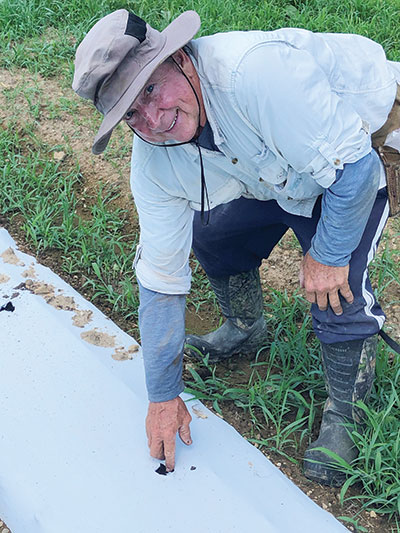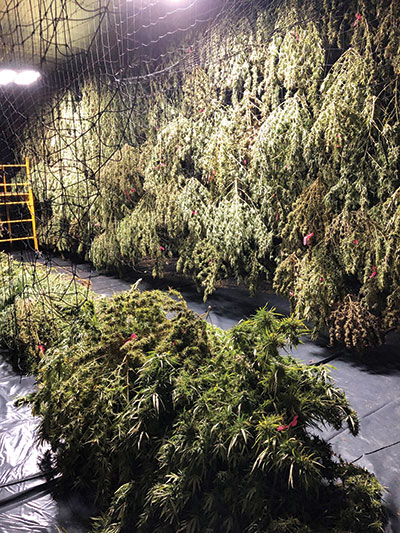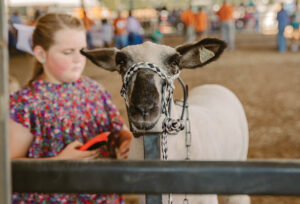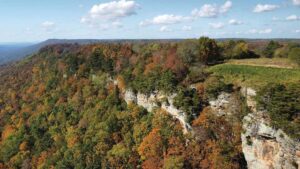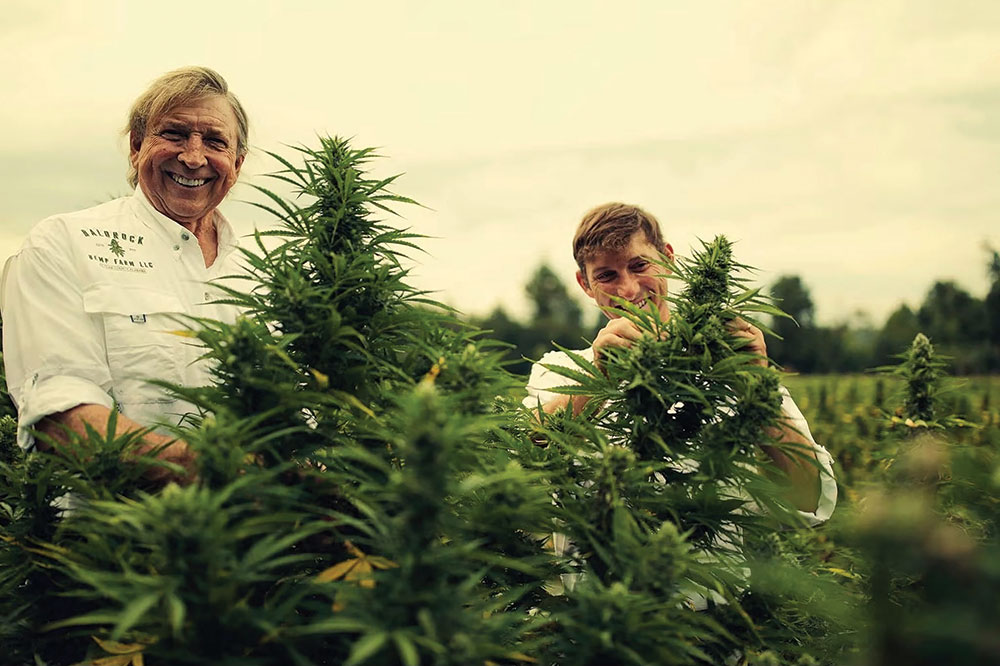
Odenville farm family pioneer new crop
Story by Scottie Vickery
Submitted photos from Tiffany Roach, TNR Creative,
and Scott McLeod
There were days not too long ago when Bobby Isbell looked out from the front porch of his Odenville farm and saw lost opportunity. Years before, the family had dabbled in running a Christmas tree farm, but the fields had been dormant for a while.
“All we had out here was grass,” the poultry farmer of 32 years said of the six acres that make up his yard. For Bobby, who has a love of agriculture running through his veins, it was a blank canvas of sorts. The more he looked at the land, the more he could picture a lush green crop dotting the landscape.
That’s why he decided to join the first wave of farmers in Alabama to grow industrial hemp, a variety of the Cannabis sativa plant species harvested specifically to make an assortment of products – everything from paper and clothing to paint and biodegradable plastics. In addition, cannabidiol, or CBD oil, is made from industrial hemp and is widely used as a natural remedy for issues such as pain, inflammation and anxiety.
“I got to reading about it, and I thought we’d give it a go,” said Bobby, who opened Baldrock Hemp Farm LLC in 2019. The business, like all of his endeavors, is a family affair, and after two seasons of growing hemp and selling it to processors, the Isbells recently launched their own line of organically grown CBD creams, capsules and oils. The oils, available in different strengths, are offered with lemon, peppermint, spearmint or natural flavors. There’s even a pet food supplement with a bacon and herb flavor.
“Bobby’s always looking for an opportunity to benefit his family,” daughter-in-law Haley Isbell said. “He saw an opportunity to get us in on the front end of something, and we all trusted him. We knew if anyone could do it, he could.”
The education process
Before 2019, it was illegal to grow hemp, which comes from the same plant species as marijuana, in the United States. The Farm Bill of 2018, however, reclassified hemp from a controlled substance to an agricultural commodity. The main difference between the two is the level of tetrahydrocannabinol (THC), the chemical usually associated with getting high. Industrial hemp has a THC level of 0.3 percent or less while marijuana has higher levels of THC.
“We spend a lot of time answering that question,” Haley, who coordinates marketing for the business, said with a laugh. “No matter how many times we say it’s not the same thing, we still get the wink-wink, nod-nod sometimes.”
Before they could educate their customers, they had to learn more themselves. Bobby’s son, Bobby III, who is also a poultry farmer, jumped in with both feet. They were among the first Alabama farmers licensed to grow or process hemp in the state’s pilot program in 2019.
Growers, handlers and processors must be licensed by the Alabama Department of Agriculture and Industries (ADAI), and the regulation process is strict. According to Gail Ellis, hemp program manager for the department, the state issued 173 grower licenses for 2021, including three in St. Clair County.
Bobby’s wife, Lynn, said that her husband and son participated in seminars and conferences in Tennessee, Kentucky and other places to learn more about the industry, the products and the methods for growing hemp. “We tried to pick up as much knowledge as we could before we got into it,” Bobby said. “You can read all you want, but you have to learn by doing it. The first year was all work and no play.”
Besides following state regulations, the Isbells have also earned organic certification from Food Alliance. “My generation wants a more organic product with fewer chemicals, so we went through the process of being certified,” Haley said. “We wanted to offer a hemp product that was locally and organically grown so that we could provide our customers with the most natural way to address health and wellness issues.”
Learning curve
In addition to growing hemp, Bobby and his son are both still poultry farmers. Bobby raises about 125,000 chickens while Bobby III has about 127,000. “That first year, we were like single women,” Lynn said. “We didn’t really see them that much.”
Bobby and his son worked from daylight to dark, plowing the field, tilling the soil and preparing to plant hemp seeds in six acres. “That was way too much,” he said. “Now we just grow four acres, which is about 10,000 plants.” The planting process takes place in late May, and the crops are harvested in September or October.
The first year, they planted the seeds by hand. Last year, they germinated the seeds in the greenhouse and planted the seedlings. “That way you know you’ve got a plant in every hole,” rather than a seed that may or may not grow, Bobby said.
Like the vast majority of hemp grown in Alabama, the Isbells’ crop is grown for CBD oil. “Once the days start getting longer, they start sending out flowers and buds,” he said. “That’s what we want – the flowers to produce the oil. Out west, a lot of hemp is grown for the fiber. Carmakers make seats out of it.”
This year’s crop is the Isbells’ third, and they’ve learned a lot along the way. The first year, they planted the rows too close together and couldn’t get a mower through, so they had to cut the grass with a weed trimmer. This year, they made sure to leave enough space for a riding lawn mower.
Although the Isbells use organic methods to control bugs, Alabama hemp farmers have to be careful about the types of pesticides they use. “If you spray with something you’re not supposed to and take it to a processing plant, they’ll kick it out,” Isbell said.
In addition to approving seed sources and pesticides, the ADAI tests each crop in the state for THC levels, as well. If the level is higher than 0.3 percent, the field will be destroyed, according to information on the agency’s website. Growers must also submit GPS coordinates, which are forwarded to law enforcement so that officers can differentiate between a legal hemp crop and an illegal marijuana crop.
Bobby said he talked with the St. Clair County Sheriff’s Department, the district attorney’s office, and the Moody and Odenville police departments before planting for the first time in 2019. They also put up a fence with a green screen to keep animals out of the field and to discourage curious visitors. “Lots of people have stopped and looked, but we haven’t had any issues so far,” Lynn said.
The final product
Once the hemp is ready to be harvested – about 100 to 110 days after planting – the workload really increases. Last year they hired extra help, and it takes about two weeks to get it all out of the field. “We cut it by hand, and we try not to ever let it hit the ground,” Bobby said. “We unload it by hand, and then we hang it in the drying shed by hand.”
The Isbells hung netting from ceiling to floor in the climate-controlled building and they stand on scaffolding to hang the hemp upside down in the nets. The crop dries for 7-10 days, and it takes two or three cycles to get all of the hemp dried. “It’s like cooking. If you rush it, you don’t get a good end product,” Bobby said.
Once dried, the hemp is stripped by hand, and they collect the finished product in 75- to 100-pound bags. The first year, they loaded up the bags and took them to a processor in Colorado since there weren’t many options in Alabama at the time. Last year, they used a processor in Huntsville.
The Isbells launched the Baldrock Hemp Farm line of CBD products in February, and the oils, creams and capsules are produced from their hemp by Sustainable CBD in Selma. “We definitely believe in what we’ve got, and we have lots of repeat customers,” said Haley, who designed the label and launched the website, baldrockhemp.com. “It’s a natural product that a lot of people have found relieves anxiety, joint pain and other symptoms.”
The family is some of its own best customers. Bobby III has found it helps him sleep when his body can’t shut down after a full day of physical labor. Bobby’s 87-year-old father uses the cream for joint pain, and Lynn takes it every night. “Sometimes, if I’ve been anxious, I’ll put a dropperful of the lemon flavored oil in my tea, and the anxiousness just goes away.” A family friend with a stressful job said that it helps keep him calm, Bobby said.
Although adding a hemp farm to the demands of poultry farming has been a tremendous undertaking, the Isbells said they are glad they took the leap of faith. “I enjoy it,” Bobby III said. “It gives me something to do in the summer.” The comment doesn’t surprise his wife.
“They can’t sit still,” Haley said of her husband and father-in-law. “If they hadn’t done hemp, they would have found something else.”











